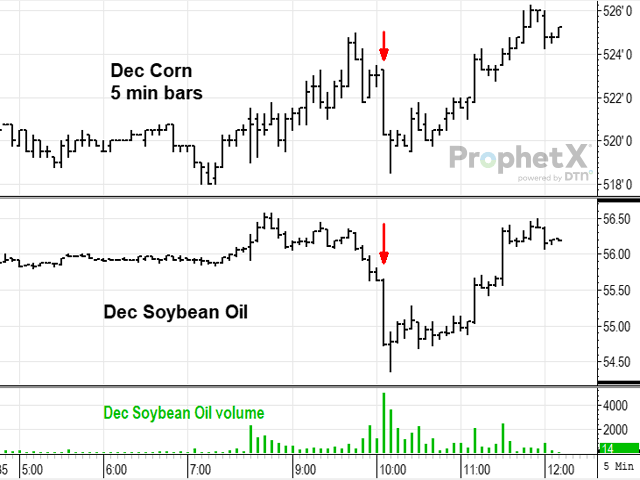Supposed RFS Numbers Leak Moves Prices
RFA Cites Proposed RFS Blend Volumes as 'Spoofing Attempt'
This article was originally posted at 1:34 p.m. CDT on Wednesday, Sept. 22. It was updated with additional information at 2:37 p.m. CDT on Wednesday, Sept. 22.
**
OMAHA (DTN) -- Prices for ethanol Renewable Identification Numbers (RIN), corn and bean oil fell Wednesday morning after multiple energy pricing services released proposed ethanol blend volume numbers for 2020 through 2022 that a lead biofuels trade association claims are a "spoofing" attempt. The "spoof" comes as the ethanol industry expects the Environmental Protection Agency to release renewable volume obligations (RVOs) for the years 2020-22. Industry observers have speculated the RVO numbers could come from the agency on Friday.
The Renewable Fuels Association sent out an email midmorning Wednesday stating that the group had been made aware that some reporters were receiving an email showing "fake 2020-2022 RVO numbers that were supposedly shared by RFA with its members."
RFA wrote: "We want you to know this is a complete fabrication and a shameful 'spoofing' attempt. We are trying to get to the bottom of who is sending this and why. RFA never sent out any such email or circulated any potential RVO numbers to our member companies."
RFA added: "RFA does not have any information regarding the 2021-2022 RVO numbers or possible revisions to the 2020 RVO. Like everyone else, we are anxiously awaiting the public release of the RVO proposals and will have more information and comment at that time."
P[L1] D[0x0] M[300x250] OOP[F] ADUNIT[] T[]
EPA is responsible for releasing the final RVO numbers.
An RFA spokesman declined to comment further on the situation.
Just after 10 a.m. CDT on Wednesday, the December corn contract dipped 5 cents -- going from $5.23 1/2 to $5.18 1/2 in a quick price dip. The December soybean bean oil contract also dropped a penny a pound on heavy volume at around the same time.
Ethanol D-6 RIN credit prices fell from $1.04 to 92 cents each before ticking back up to 94 cents.
Numbers posted by OPIS, Bloomberg and Reuters "leaked view" of supposed RVO numbers showed a change in 2020 blend volumes. The 2020 blend volumes were previously finalized at 20.09 billion gallons for total renewable fuel, but the "revised" figures were posted at 17.129 billion gallons, a 2.96-billion-gallon decline in the 2020 RVO.
The petroleum industry and supporters in Congress have been calling for EPA to lower the 2020 RVO figure to fall more in line with the lower overall fuel usage that came with the pandemic shutdowns that froze fuel usage in spring 2020. If the leaked numbers are accurate, or close to it, then that would be viewed as a win for the petroleum industry.
For conventional renewable fuel -- which largely means corn-based ethanol -- the reported volumes released by Bloomberg, OPIS and Reuters come in at 12.5 billion gallons for 2020. That's down from the 14.41 billion gallons for 2020 that had been originally set by EPA on Dec. 19, 2019.
The potential spoof number also indicates lower projected conventional ethanol use for 2021 and 2022, as well, coming in at 13.453 billion gallons for 2021 and 14.096 billion gallons for 2022. The Renewable Fuels Standard sets conventional biofuel use at 15 billion gallons.
An EPA spokeswoman responded to DTN that the agency does not have any comment on the reports.
Responding to the possible RVO numbers, Growth Energy CEO Emily Skor said the potential blend volumes would reflect that President Joe Biden's administration is not meeting its commitments to the biofuels industry.
"If these rumors are true, this would be backpedaling on the president's commitments to uphold the RFS and would add 22.8 million metric tons of carbon emissions back into the air -- the equivalent of adding 5 million cars back on the road. It's hard to imagine any justification for the administration to make such a move," Skor said.
Chris Clayton can be reached at Chris.Clayton@dtn.com
Follow him on Twitter @ChrisClaytonDTN
(c) Copyright 2021 DTN, LLC. All rights reserved.




